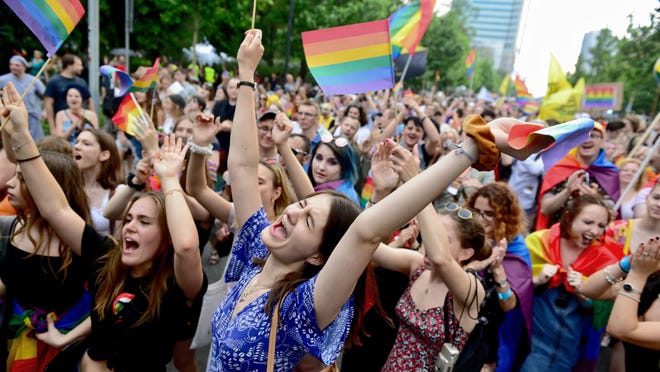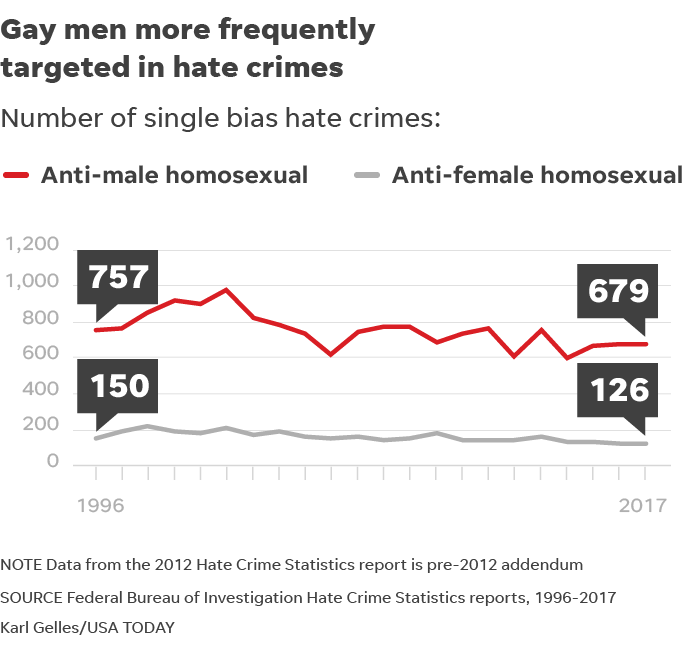
Friday marked 50 years since protesters fought back against a police raid of New York’s Stonewall Inn and catalyzed the modern gay rights movement. But despite decades of progress, members of the LGBTQ community across the country are experiencing targeted acts of violence.
Hate crimes against LGBTQ people have been on a slight rise over the past three years, according to FBI data. While most hate crimes in the U.S. are motivated by bias toward race and religion, the number of crimes based on sexual orientation rose each year from 2014 to 2017, when 1,130 incidents were reported. Of those crimes, a majority targeted gay men.
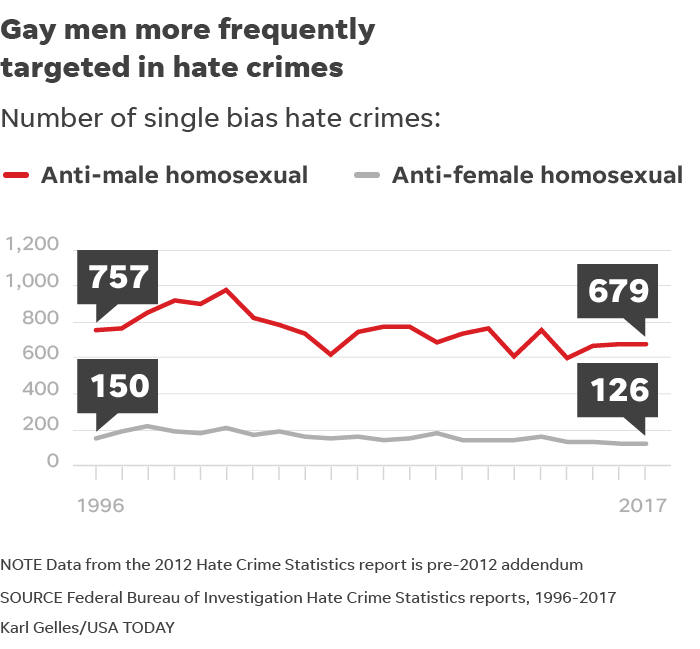
Crimes motivated by a bias toward gender identity – against transgender and non-binary individuals – have generally risen since 2013, when the FBI first began recording them. At least 11 transgender people have been fatally shot or killed by other violent means in 2019, according to the Human Rights Campaign. Recent media reports suggest that crimes against black transgender women, in particular, have spiked this year.
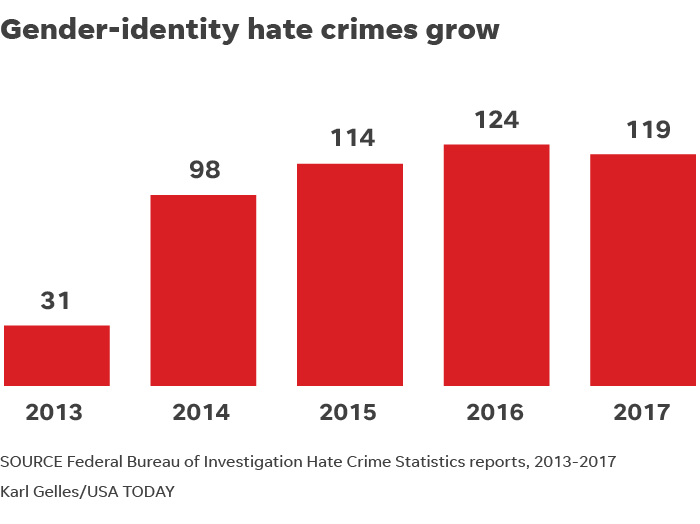
The FBI data, however, likely dramatically underestimates the true number of hate crimes against the LGBTQ community, experts, say, given flaws in the current data collection process and massive discrepancies with the much larger number of self-reported incidents.
A better gauge of hate crime trends in the U.S. may be the National Crime Victimization Survey (NCVS), a household-based survey administered by the U.S. Census Bureau. This self-reported data suggests that Americans experience closer to 200,000 hate crimes each year – a far cry from the FBI’s estimate of approximately 7,500.
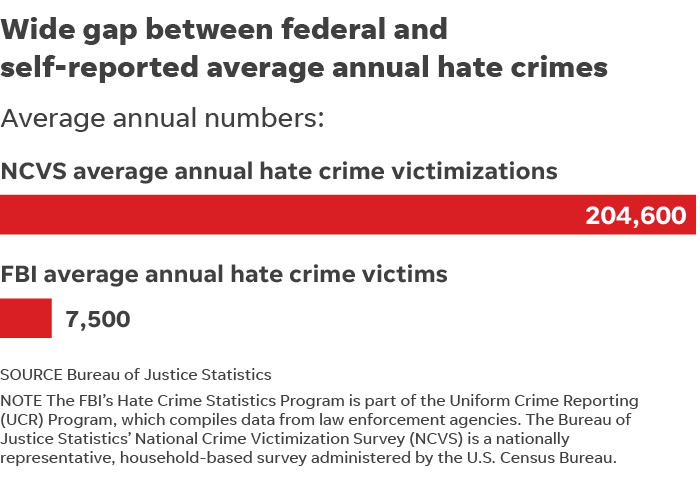
The NCVS data also suggests that a greater percentage of all hate crimes are motivated by a bias against sexual orientation than the FBI data.
Many people who experience hate crimes do not report the incidents to law enforcement, for various reasons.
“To the extent that we don’t have universal protections from discrimination on the basis of employment, housing, and public accommodations, if someone comes forward to report a hate crime, they could also be officially outing themselves as LGBTQ. In a smaller or rural community, that outing could result in an eviction or loss of a job,” said Robin Maril, Human Rights Campaign Associate Legal Director.
Are the young really the most tolerant? Results of this LGBTQ survey are ‘alarming’
Some advocates point to the Trump administration’s policies and rhetoric as potential catalysts for the increasing violence in recent years.
After Trumps’ election, the Southern Poverty Law Center counted 201 incidents of election-related harassment and intimidation across the country, including incidents targeting the LGBTQ community and people of color.
In 2017, the president announced on Twitter that he would be banning transgender people from the military. At an annual National Prayer Breakfast this past February, Trump defended a state-funded Michigan adoption agency’s efforts to ban gay and lesbian couples from adopting children.
“The level of discourse that we are getting from the Trump administration and leadership only hurts our community, only hurts trans people,” Maril said. “It gives a sense of impunity and a license to harm folks.”
Under the Obama administration, the average number of anti-gay hate crime incidents reported to the FBI each year was higher than the number of incidents reported in 2017. In 2008, the FBI reported 1,297 anti-gay hate crime. That number fluctuated but eventually fell to 1,135 in 2012 and 1076 in 2016.
Flaws in available data
The Hate Crime Statistics Act of 1990 requires attorneys general to report incidents submitted from state and local law enforcement agencies to the FBI, which publishes an annual Hate Crime Statistics report. Some high-profile cases, however – such as the murder of Heather Heyer in Charlottesville – have been historically omitted from these annual reports, raising questions about the accuracy of federal hate crime data.
Hate crimes motivated by bias against sexual orientation and gender identity are illegal under the 2009 Matthew Shepard and James Byrd Jr. Hate Crimes Prevention Act. But state laws aren’t so clear cut. An estimated 53% of LGBTQ adults in the U.S. live in states that don’t have hate crime laws covering sexual orientation and gender identity, according to the Movement Advancement Project, a nonprofit think tank.
Local and state law enforcement agencies are not required to report hate crimes. However, the number of agencies participating in hate crime data collection has risen over the last two decades, from 11,354 agencies in 1996 to 16,149 agencies in 2017.
As more agencies have begun to participate in the FBI program, the percentage of agencies reporting that any hate crime incidents took place has declined. In 2017, only 12.6% of agencies reported any hate crimes at all. All others reported zero hate crimes. But media reports and self-reported data from the NCVS say otherwise.
“There are entire cities that don’t report any hate crimes. Cities like Miami might report zero hate crimes, but a hate crime does occur in Miami at least once a year,” Maril said.
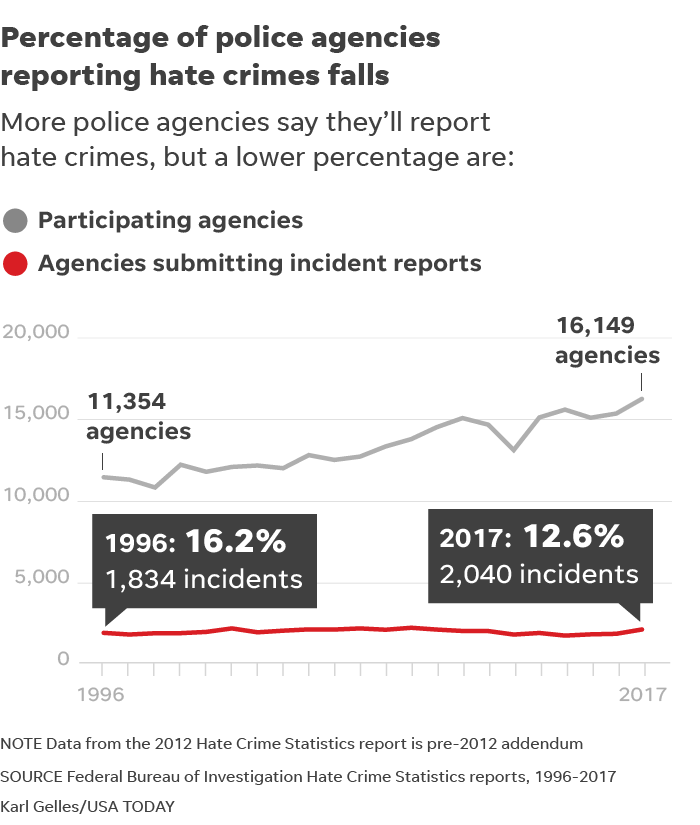
“The data is embarrassingly bad for a country that supposedly takes public safety so seriously. One would think that we would do a better job of collecting crime data. And none of our crime data is worse than our hate crime data,” said Roy L. Austin, who was Deputy Assistant Attorney General for the Justice Department’s Civil Rights Division under the Obama administration. “There’s a serious disconnect, and everyone knows this disconnect exists. But no one with the power to do anything about it seems willing to do what is necessary to get this right.”
Triple homicide targeting LGBTQ:2 gay men, 1 transgender woman murdered
Attacks leave black trans women ‘constantly feeling on edge’
This past Pride Month witnessed a slew of violent anti-LGBTQ hate crimes. For trans women of color in Texas, recent months have brought terror. Dallas resident Muhlaysia Booker, 23, was assaulted in April in an attack that went viral on social media, then fatally shot in May. Just weeks later, on the first day of Pride, Chynal Lindsey, 26, was found dead – the third black trans woman murdered in Dallas in less than a year.
Dee Dee Watters, a black trans activist and president of Black Trans Women Inc., had just left Booker’s wake when she heard about Lindsey’s death.
“We were en route back to Houston, and we got word that there was a young lady that they fished out of the lake in Dallas,” Watters said, adding, “We weren’t even able to complete the mourning of the loss of this young lady – then to get hit with another individual that was murdered.”
Naomi Green, a black trans woman and program coordinator at Abounding Prosperity Inc., an organization that supports Dallas’s black LGBTQ community, said she’s now learning to shoot a gun and is organizing self-defense classes.
“It’s very traumatizing,” Green said. “You’re constantly feeling on edge and looking over your shoulder.”

For some black trans women, daily experiences of bias are not unusual. Kaye Ingram, 29, moved to Dallas in 2016 but was rejected from various jobs for many months. She stayed with friends until she was finally able to secure housing through a program in Dallas – an apartment in the same neighborhood where Muhlaysia Booker was killed.
Last year, Ingram was leaving a convenience store in her neighborhood when a man hurled slurs at her, then punched her in the eye.
“I remember the trauma of actually being hit and having slurs thrown on you as people watch and … laugh,” Ingram said. “When I saw the Muhlaysia story, that just made me remember how I felt in that moment – how afraid I was. I don’t have any family here, and I was afraid to retaliate because it’s an open carry state.”
Ingram told USA TODAY that she has been targeted based on her gender identity several times in the past two years: a co-worker verbally degraded her, a man yelling from his balcony called her “an abomination,” and boys riding by on bikes threw rocks at her. She said that she has been raped three times.
A survey by the National Center for Transgender Equality found that nearly half of transgender people experience sexual assault in their lifetime. That percentage increases among transgender people of color: American Indian (65%), multiracial (59%), Middle Eastern (58%), and black (53%).
“We’re at the bottom of the totem pole – being black, then being trans, then being a woman,” Ingram said. “I’m scared. I’m trying to hurry up and leave.”
SARAH MCBRIDE:She was sexually assaulted within months of coming out. She isn’t alone
The lifetime prevalence of rape is also higher for bisexual women (46%) compared to heterosexual women (17%), according to the CDC. The lifetime prevalence of sexual violence other than rape is 46% for lesbians, 75% for bisexual women and 43% for heterosexual women. The vast majority report male perpetrators.

‘We need the stories about what’s happening’
Available hate crime data may be imperfect, but some believe that there is hope for the reporting process.
“The single most important thing is to link any federal funding on crime prevention on providing accurate and regular numbers. The second thing to do is to change the way the national incident-based reporting system is done so that the national numbers are produced more frequently and in a way that is more user friendly,” Austin said.
Others advocate making hate crime reporting mandatory under federal law, instituting stronger protections against hate crimes at the federal and state level, and passing legislation that prevents discrimination across the board. But not everyone supports giving law enforcement more power over communities that have been historically mistreated by police.
‘Wrong, plain and simple’:50 years later, NYPD apologizes for Stonewall riots
“I’m not a data wonk, but I know what data means to our elected officials,” said Lou Weaver, Transgender Programs Coordinator for the advocacy group Equality Texas. “We need the data. We need the stories about what’s happening.”
The 2018 edition of the annual report Hate Crime Statistics is tentatively scheduled for release in the fall of 2019.
If you’ve experienced or witnessed anti-LGBTQ violence, or are concerned about someone who has, you can call the Anti-Violence Project hotline 24/7 at 212-714-1141. All calls are confidential. You can also report violence anonymously or ask for a counselor to reach out to you online.
Follow Grace Hauck on Twitter @grace_hauck.
Banning pride flags at US embassies:Mike Pence says it’s ‘the right decision’
